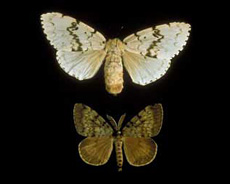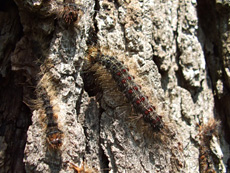Gypsy moths poised to invade

Adult gypsy moths. The female, top is larger and flightless. The smaller male is a strong flier.

A gypsy moth caterpillar at Fermilab in 2008.
The winter look of barren trees you see today could return this summer. The culprit? The gypsy moth, Lymantria dispar. Introduced into North America from Europe in the mid-19 th century, this pest, spotted at Fermilab last year, has been a persistent threat to healthy forests.
The gypsy moth caterpillar has a voracious appetite for tree foliage, especially oaks. A typical infestation can strip a mature oak tree of its leaves within a few days. Last summer, Roads and Grounds spotted a large infestation of these pests in the area of the fire station and Site 38. Later in the year, our “moth scouts” spotted numerous egg masses on the trunks of trees throughout the laboratory, so we can expect a large influx of hungry caterpillars in June or July. Almost 100 percent of the leaves on many oak trees will disappear.
But there is some good news. Although for a time in mid-summer our normally lush oaks will be denuded, they will recover, and within a few weeks will have a new set of leaves. By that time, the gypsy moth caterpillars will have metamorphosed into adults, and the trees will be safe, at least for this year.
The other good news is that the caterpillars have accumulated an impressive collection of natural enemies over the last century and a half. The list includes natural pathogens, like funguses and bacteria, parasitic insects that lay their eggs on or within moth larvae and predators such as ground beetles and rodents. These are sufficient to kill off many of the caterpillars before they reproduce.
Fermilab will not use aerial spraying of chemicals and bacterial biocontrols to control the moths because it is inconsistent with sound ecological management. Use of such a “blunt instrument” kills all moths and butterflies indiscriminately, has a harmful impact on potential Gypsy moth predators and, in some cases, represents possible human health risks.
-- Rod Walton, ecologist
|